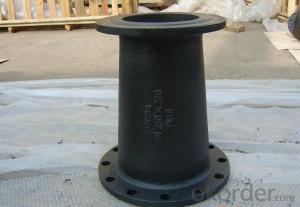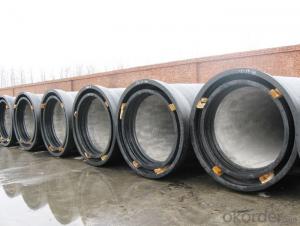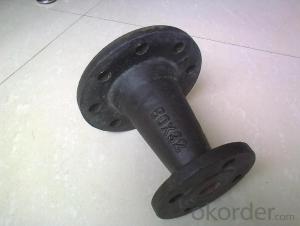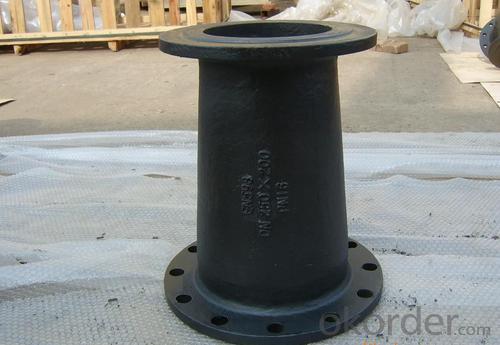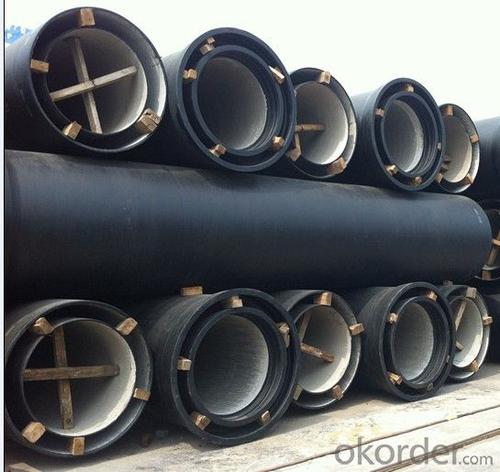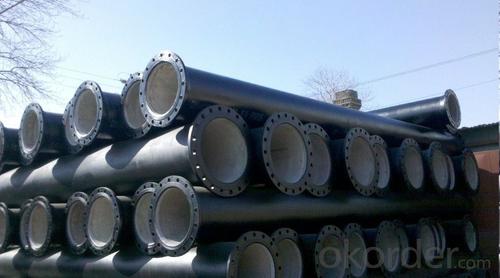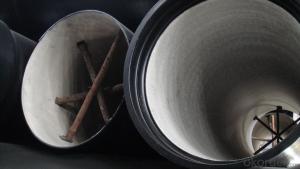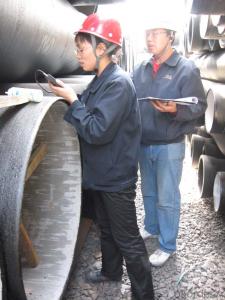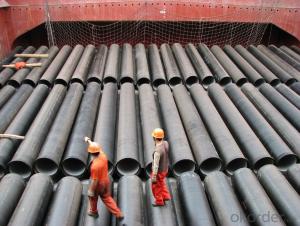Ductile Iron Pipe On Sale Made In China DN200
- Loading Port:
- Tianjin
- Payment Terms:
- TT or LC
- Min Order Qty:
- 1000 m
- Supply Capability:
- 10000 m/month
OKorder Service Pledge
OKorder Financial Service
You Might Also Like
1.Packaging & Delivery
Packaging Detail: | DN80-300 bundled with steel belt ( the bundle size see the product detail part) DN400-1200 are in bulk |
Delivery Detail: | at least 5days for MOQ |
2.Specifications
Ductile iron pipe comply with ISO2531/EN545
1)We are factory
2)Best quality
3)Competive price
4)On time delivery
3.Features:
Facilitating high resistance to loadings, pressure and vacuum with high tensile strength,
Enabling high resistance to corrosion,
Not requiring cathodic protection,
Less operating cost since cast pipes have larger nominal diameter than polyethylene pipes.
Being the best pipe in case of an earthquake, with its ability of resilience and resistance to impacts without deformation,
Long product life, exceeding 50 years,
Preserving the quality of water with healthy interior coating.
4.Applied Standards:
General Design | ISO 2531 |
Internal Lining | ISO 4179 |
External Coating | ISO 8179 |
Polyethylene Coating (Optional) | ISO 8180 |
5.Joint Types:
Push-on Type | TYT Type |
Standard Type |
6. Diameters:
Pipes | Ø80 – Ø1200 mm (L = 6m, and 5.7m) |
Fittings | Ø80 - Ø2200 mm |
7. Wall Thickness:
Pipes | C and K classes |
Fittings | Class K10 - K12 |
8.Test Pressures:
Pipes | for Ø80 - Ø300 mm | 50 bar / 40 bar |
for Ø350 - Ø600 mm | 40 bar / 30 bar | |
for Ø700 - Ø1000 mm | 32 bar / 25 bar | |
for Ø1100 - Ø2600 mm | 25 bar |
Fittings | for Ø40 - Ø300 mm | 25 bar (*) |
for Ø350 - Ø600 mm | 16 bar | |
for Ø700 - Ø2600 mm | 10 bar | |
(*16 bar for fittings with PN10 flanges) | ||
9.Materials:
Pipe | Ductile iron casting, minimum 420 MPa tensile strength |
Internal Lining | Concrete Lining, ISO 4179 |
Socket Internal 10.Lining | 200 micron epoxy coating |
External Coating | 70 micron bitumen coating on 130 gr/m2 zinc coating, ISO 8179 |
Fittings | Ductile iron casting, minimum 420 MPa tensile strength |
Internal Lining | Concrete Lining, ISO 4179 |
External Coating | 70 micron bitumen coating on 130 gr/m2 zinc coating, ISO 8179 |
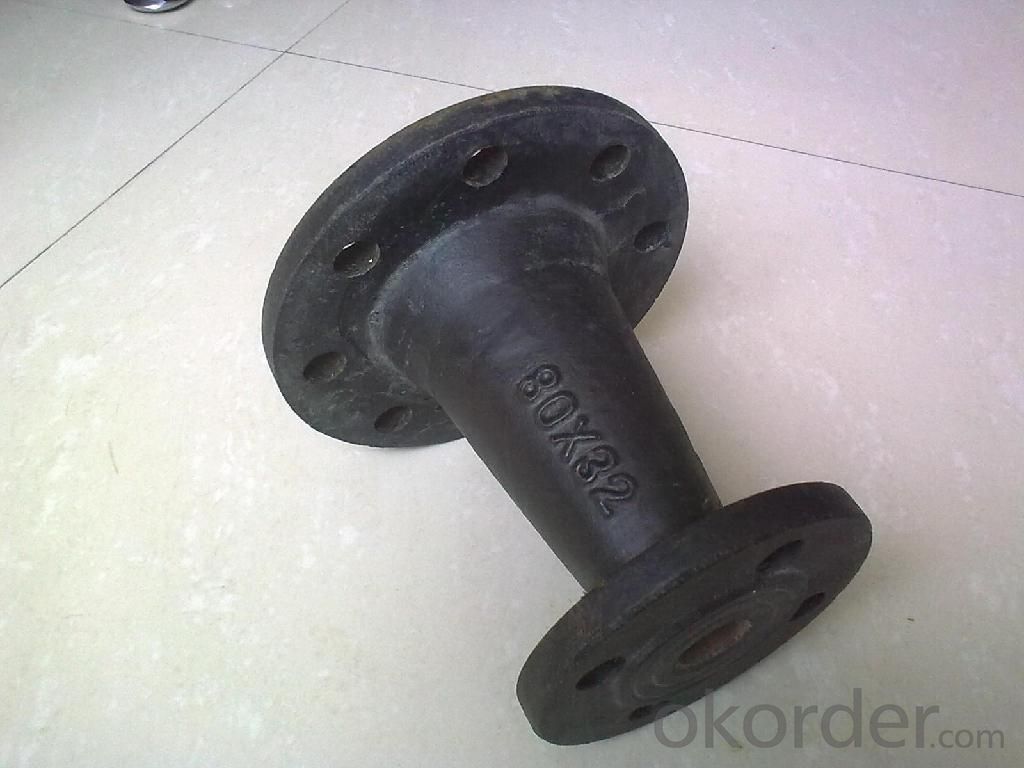
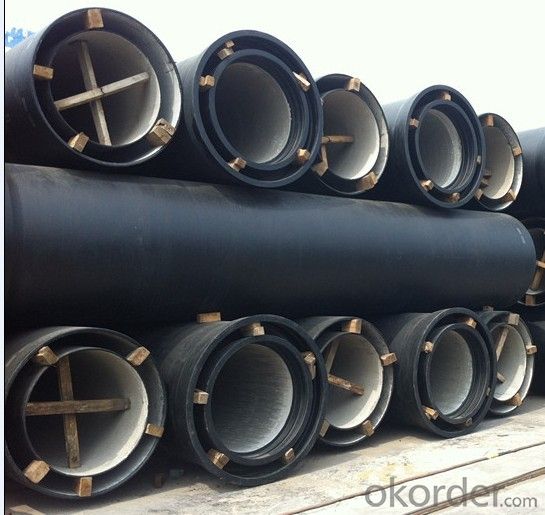
- Q: Are ductile iron pipes suitable for potable water distribution systems?
- Yes, ductile iron pipes are suitable for potable water distribution systems. Ductile iron pipes have excellent corrosion resistance, high strength, and durability, making them a reliable choice for transporting drinking water. They are also widely used in water infrastructure due to their ability to withstand high pressures and external loads.
- Q: Are ductile iron pipes suitable for pressure sewer systems?
- Yes, ductile iron pipes are suitable for pressure sewer systems. Ductile iron pipes have been widely used in various applications, including pressure sewer systems, due to their high strength and durability. These pipes are able to withstand high pressure and provide a reliable and long-lasting solution for transporting sewage under pressure. Ductile iron pipes also have excellent corrosion resistance, which is crucial in sewer systems where they are exposed to various chemicals and contaminants. They are resistant to both internal and external corrosion, ensuring that the pipes remain intact and functional over time. Furthermore, ductile iron pipes have a smooth internal surface, which helps to minimize friction and improve the flow capacity of the sewer system. This ensures that the pipes can handle the required flow rates and prevent any blockages or backups. In addition to their strength and corrosion resistance, ductile iron pipes are also known for their ease of installation. They can be easily cut and joined using a variety of methods, making them a convenient choice for pressure sewer systems. Overall, ductile iron pipes are a suitable and reliable choice for pressure sewer systems due to their high strength, corrosion resistance, smooth internal surface, and ease of installation.
- Q: What are the common methods for flow control in ductile iron pipes?
- Ductile iron pipes offer various options for flow control. Among them, valves are commonly used. Valves enable the regulation of water or other fluids flowing through the pipes. They can be either manually operated or automated, depending on the system's specific needs. Flow restrictors or flow limiters represent another method for controlling flow in ductile iron pipes. These devices are installed in the pipes to reduce the flow rate and ensure that the system operates within its intended parameters. Flow restrictors are particularly beneficial in situations where flow control is necessary to prevent damage or optimize system efficiency. Pressure regulators also contribute to flow control in ductile iron pipes. By maintaining a specific pressure level within the system, these devices help prevent excessive pressure that can lead to pipe bursts or other forms of damage. Furthermore, pressure regulators aid in maintaining a consistent pressure throughout the system, ensuring predictable and controlled flow. Flow meters provide yet another means of achieving flow control. These devices are installed in the pipes to measure the rate at which fluid passes through them. By monitoring the flow rate, operators can adjust valves or other flow control devices to maintain flow within the desired range. Flow meters are especially valuable in applications where accurate flow measurement is critical, such as industrial processes or water distribution systems. In conclusion, flow control in ductile iron pipes can be achieved through the use of valves, flow restrictors, pressure regulators, and flow meters. These methods can be combined or used individually, depending on the specific requirements of the system.
- Q: How does ductile iron pipe perform in high-velocity flow conditions?
- The performance of ductile iron pipe is exceptional in conditions with high-velocity flow. It can endure the forces exerted by these flows without experiencing significant damage or failure, thanks to its unique properties like high tensile strength and impact resistance. One advantage of ductile iron pipe is its ability to withstand water hammer, which is a sudden increase in pressure caused by the rapid deceleration or change in direction of water flow. This is particularly crucial in high-velocity flow conditions, where water velocity is significantly higher than normal. Ductile iron pipes are designed to absorb and dissipate the energy generated by water hammer, protecting the pipe and the surrounding infrastructure. Moreover, ductile iron pipe has excellent flow characteristics, ensuring smooth and efficient water transport even at high velocities. This is especially important in applications that require quick transportation of a large volume of water, such as industrial processes or fire protection systems. The smooth interior surface of ductile iron pipe minimizes friction and pressure losses, allowing water to flow freely and efficiently, reducing energy consumption and operating costs. Furthermore, ductile iron pipe is highly resistant to corrosion, which is a common issue in high-velocity flow conditions where the water may contain aggressive chemicals or particulates. The protective lining and coating systems used in ductile iron pipes create a barrier against corrosion, prolonging the lifespan of the pipe and maintaining its structural integrity. In conclusion, ductile iron pipe is ideal for high-velocity flow conditions due to its ability to withstand water hammer, excellent flow characteristics, and resistance to corrosion. Its strength, durability, and reliable performance make it a preferred choice for various applications, ensuring efficient water transport even in demanding environments.
- Q: Are ductile iron pipes suitable for use in hydroelectric dams?
- Yes, ductile iron pipes are suitable for use in hydroelectric dams. Ductile iron is a type of iron that has a higher degree of flexibility and strength compared to traditional cast iron. This makes it an ideal choice for many applications, including water transmission systems in hydroelectric dams. Ductile iron pipes are known for their durability and resistance to corrosion, which is crucial in a dam environment where water exposure is constant. They can withstand high pressures and extreme temperatures, making them suitable for the demanding conditions found within hydroelectric dams. Additionally, ductile iron pipes have excellent joint integrity, ensuring that they remain leak-proof and reliable over their lifespan. This is important for maintaining the efficiency and effectiveness of a hydroelectric dam's water transmission system. Furthermore, ductile iron pipes are cost-effective compared to other materials, such as steel or concrete. They have a long service life, require minimal maintenance, and are readily available, making them a practical choice for hydroelectric dam projects. In conclusion, ductile iron pipes are a suitable choice for use in hydroelectric dams due to their durability, resistance to corrosion, high-pressure tolerance, joint integrity, and cost-effectiveness. They provide the necessary strength and flexibility to efficiently transport water within the dam, contributing to the overall success and longevity of the hydroelectric power generation system.
- Q: Are ductile iron pipes suitable for underground river crossings?
- Yes, ductile iron pipes are suitable for underground river crossings due to their high strength, durability, and resistance to corrosion. They can withstand the pressure of flowing water and provide long-term reliability in such challenging environments.
- Q: How is ductile iron pipe recycled?
- Ductile iron pipe, a material known for its durability, is commonly used in infrastructure systems like water and wastewater pipelines. Rather than being disposed of in landfills, ductile iron pipe can be recycled when it reaches the end of its life cycle. The recycling process for ductile iron pipe begins by removing it from the ground. Typically, a trench is dug to access the pipe, which is then cut into smaller, manageable sections using specialized equipment. These sections are then transported to a recycling facility. At the recycling facility, the ductile iron pipe undergoes further processing to eliminate any contaminants. This involves removing any fittings or joints that may be attached to the pipe. Additionally, non-iron materials like rubber gaskets or coatings are separated and discarded. Once the pipe has been cleaned and prepared, it is usually crushed or shredded into smaller pieces. This increases the material's surface area, making it easier to melt down in the next stage of the recycling process. The crushed or shredded ductile iron pipe is then melted in a furnace at high temperatures, a process called smelting. Smelting converts the solid iron into a liquid state. During this process, impurities and any remaining non-iron materials rise to the surface and are removed. After smelting, the molten iron is poured into molds to create new products. These molds can produce various ductile iron products, including new pipes, fittings, valves, and manhole covers. The recycled ductile iron products possess the same qualities and durability as those made from virgin materials. Recycling ductile iron pipe not only reduces the need for new materials but also conserves energy and resources. The recycling process requires less energy compared to producing iron from raw materials, resulting in a lower carbon footprint. Furthermore, recycling ductile iron pipe helps minimize waste and promotes a circular economy by giving new life to a previously discarded material.
- Q: What is the expected abrasion resistance of ductile iron pipes?
- Ductile iron pipes possess a high level of abrasion resistance, which is widely acknowledged. These pipes are renowned for their durability and strength, making them suitable for a range of applications, such as the conveyance of water, sewage, and other fluids. The composition of ductile iron pipes, containing significant amounts of carbon and silicon, contributes to their ability to withstand abrasion. The design of ductile iron pipes is specifically tailored to withstand the abrasive forces that can arise during fluid transportation. These pipes feature a smooth internal surface, which reduces friction and minimizes the risk of abrasion. Moreover, the inherent toughness and resistance to wear and tear exhibited by the material make ductile iron pipes less susceptible to damage caused by abrasive particles or debris present in the fluid flow. However, it is crucial to understand that the expected abrasion resistance of ductile iron pipes can vary depending on several factors, including the velocity and nature of the transported fluid, the presence of corrosive substances, and the installation conditions. In certain instances, additional protective measures, like linings or coatings, may be necessary to bolster the pipes' resistance to abrasion. In conclusion, ductile iron pipes are renowned for their exceptional abrasion resistance, but it is always advisable to consider specific application requirements and seek advice from experts to ensure the appropriate selection and installation of the pipes, thereby guaranteeing optimal performance and longevity.
- Q: Can ductile iron pipes be made of flexible waterproof sleeves?
- The casing can be divided into ordinary casing to be 2-4 cm thick than the pipe to be used and fixed to the wall or plate, and the pipe passes through it. Flexible bushing - between the casing and pipe, with flexible material to seal the sealing effect. Rigid casing - that is, between the casing and pipe with rigid material sealed to achieve sealing effect. Waterproof casing - is the use of the casing of the environment is to prevent liquid leakage or leakage into place (such as the pool, septic tanks, basement, etc.) is on the outer wall of the bushing is not less than 1 times increase waterproof wing, this wall is poured in the casing as a whole, not because of swelling shrinkage factor and crack and leakage.
- Q: How much is the installation fee of the 400 largest ductile iron pipe?
- Compared with the PE pipe, from the installation time, ductile pipe PE pipe installation is simple and rapid, and after the installation of internal and external pressure bearing better tightness and corrosion resistance; from the point of view, ductile pipe sealing better after installation, but also can improve the corrosion resistance through various anti-corrosion methods;
Send your message to us
Ductile Iron Pipe On Sale Made In China DN200
- Loading Port:
- Tianjin
- Payment Terms:
- TT or LC
- Min Order Qty:
- 1000 m
- Supply Capability:
- 10000 m/month
OKorder Service Pledge
OKorder Financial Service
Similar products
Hot products
Hot Searches
Related keywords
